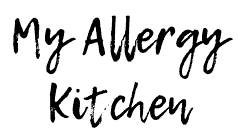In my last post I shared my story of breastfeeding my daughter with food allergies. In this post I'd like to share some tips and advice I've picked up along the way for mums who are still breastfeeding with food allergies, or who may be trying to decide whether to continue breastfeeding or not.

Power to all the breastfeeding mamas!
Can I breastfeed my baby with food allergies?
Yes absolutely, in fact my daughter's paediatrician actively encouraged me to breastfeed until at least 2 years old if I wanted to. Formula is fantastic and nutritionally balanced, but breastfeeding provides other benefits. However you do need to work hard to ensure you eat a balanced diet with all the nutrients you need to support your body while you are breastfeeding.
You might also like: Breastfeeding with Food Allergies: How long do allergens stay in breast milk?
Should I switch to formula?
This is a personal choice of course. Some mums will need or want to use formula for whatever reason and that's ok! If your baby has very severe reactions your doctor may advise you to stop breastfeeding immediately, so their diet can be medically controlled using formula milk. You may also be advised to stop breastfeeding if your baby has very many allergies or if you are struggling to pinpoint their trigger foods.
But if you're still on the fence here are some things to consider. Breastmilk contains substances that help the immune system to develop normally, which are not found in formula milk. This is even more important in babies with food allergies! It may help to reduce the severity of food allergies in babies who already have them, and reduce the risk of developing more allergies later in life.
It's also worth bearing in mind that for a baby with cow's milk protein allergy, you will be reliant on prescription formula. This means lots of trips to the doctor and pharmacy - you can't just pick it up at the supermarket. You will need to be organised and make sure that you never run out, and get extra prescriptions for your baby's growth spurts.
It may also take a while to find a particular formula that suits your baby. They may be unsettled for a while while you switch over.
Also remember that hypoallergenic/amino acid formula has a very strong, distinctive taste and it may be difficult to get your breastfed baby to make the switch. If you are going to change over, it's better to do it sooner rather than later for that reason, and allow plenty of time. Switching to formula might not be the easy option!
What should I eat while breastfeeding a baby with food allergies?
You should ask for a referral to a dietician, particularly if your baby is allergic to cow's milk. Breastfeeding mothers need a much higher amount of calcium in their diet and you need to make sure you are getting enough. Some foods are naturally high in calcium, others have calcium added to them (fortified). You can also take a supplement to top up your calcium levels. Your baby will be getting plenty of calcium from breastmilk for as long as you continue to breastfeed!
Non-dairy sources of calcium include:
- sardines and tinned salmon (with bones)
- beans and lentils
- nuts and seeds
- dark leafy green vegetables
- rhubarb
- amaranth (a grain)
- edamame beans and tofu (if you can have soya)
- figs
- raisins
- oranges
- fortified plant milks
- fortified breakfast cereals
- wheat flour and products made from flour (except wholemeal flour)
For more guidance check out this post about Postnatal Nutrition for Breastfeeding Mothers.
Can I still eat out while on an exclusion diet?
Yes, of course, but it will take more planning and preparation. Restaurants and cafes must provide information on allergens in their food - it's the law. Many restaurants have allergen menus online so you can look up which dishes are suitable for you. Alternatively, phone the restaurant you want to visit and ask if they can cater for your dietary needs. Cafes these days are also getting much better at providing allergy-friendly food. You might not have as much choice as you are used to but you can still go out and enjoy time with friends and family.
Where can I get support for breastfeeding a baby with food allergies?
The best place to get breastfeeding support in my experience is at a drop-in group. These are often run by SureStart centres, La Leche League, and the National Childbirth Trust (NCT). They are often run by 'peer supporters'. These are mums who have breastfed at least one baby and who have been trained to support other mums. Peer supporters have been through it all before. They can reassure you about what is normal and what is not, providing practical and emotional support.
They can check your baby is latching properly and discuss any issues you may be concerned about. You can find out where to get additional help in your local area (e.g. where to hire a breast pump, how to get diagnosis of an allergy, or how to get a tongue tie corrected). They can also help you plan how to continue breastfeeding when you return to work.
Breastfeeding groups are very friendly and welcoming places. You can turn up late (to be honest it's expected if you have a newborn) - they are 'drop-in' groups! They're also a great place to meet other mums and make new friends which is oh-so-important in the early weeks of parenting, and you can help to support each other in all areas as your babies grow and develop.
Other sources of support for breastfeeding mums
If you can't get to a group, don't worry! There are a number of phonelines you can call for breastfeeding support. Like the drop-in groups these are mainly staffed by peer supporters who volunteer their time to help breastfeeding mums. They are great if you are having a wobble and need some reassurance and there are no drop-in groups that day, or if something happens in the evening and you don't want to wait until the following morning to speak to someone about it.
- NCT Breastfeeding Helpline 0300 330 0700
- National Breastfeeding Helpline (government-funded) 0300 100 0212
- La Leche League Helpline 0345 120 29
The internet is another great resource for breastfeeding mums! Here are some of my favourite sites:
- Facebook groups can be a great source of support - here are my favourite Facebook groups for food allergy support.
- Kellymom - an American website with absolutely tons of information and articles about breastfeeding, including this page about food sensitivities.
- Analytical Armadillo - a blog by an IBCLC (lactation consultant - basically a breastfeeding expert!) with loads of articles about infant feeding and early parenting.
- Association of Breastfeeding Mothers - lots of factsheets to read on various topics


[…] any extra liquid. It also adds healthy fat, which is especially important for children (and breastfeeding mums) who are on a dairy-free diet. Fat helps your body absorb vitamins. In addition, children need […]